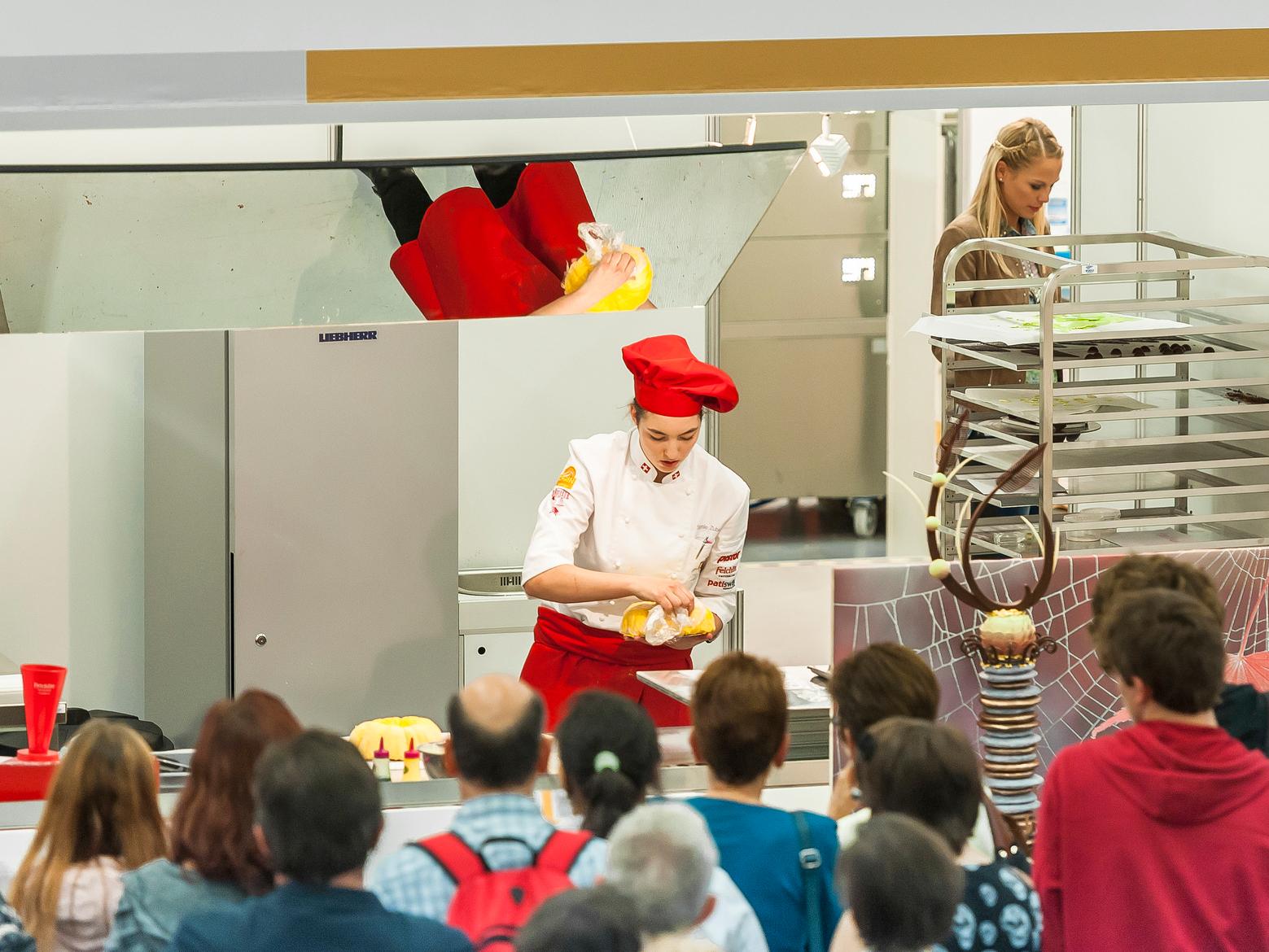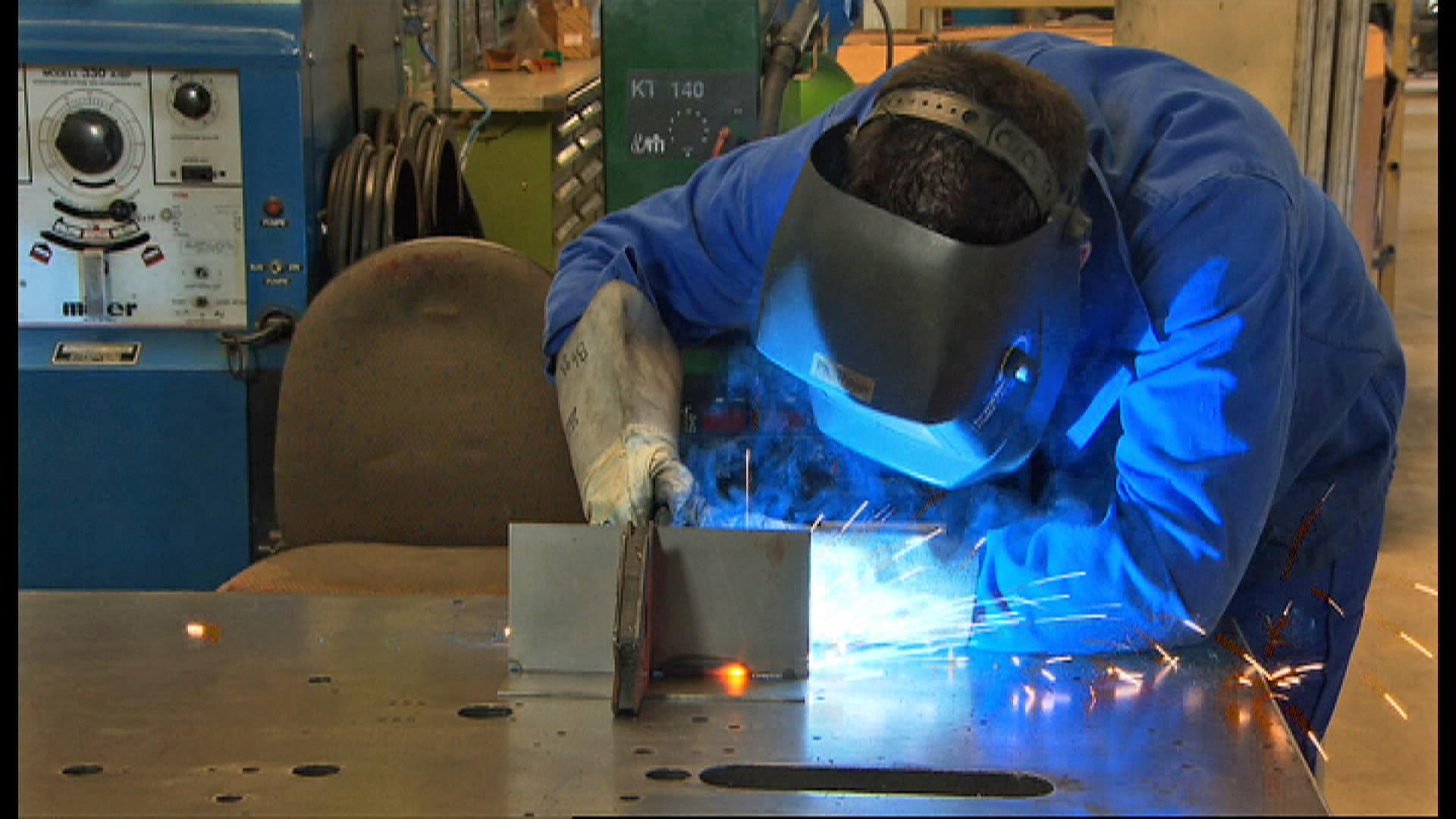Training to be the best: champion apprentices

The elite of Switzerland’s apprenticeship system compete once a year to become the best in their field. It’s a showcase for a career model that other countries are taking note of, but one that also needs to keep evolving.
“How long have I got?” shouts an apprentice baker as she squeezes dollops of cream into a mixing bowl.
“20 minutes!” comes the reply from a figure in the crowd. The teenager is one of many competing to be crowned the best Swiss apprentice in their field of work at a four-day championship of apprentices, SwissSkills, in the capital, Bern.
Around 155,000 people, mostly teenagers, have turned out to watch the star chocolate-makers and fashion designers of the future sweat it out under the sharp eyes of the judges and huge crowds.
Around two-thirds of young people in Switzerland choose to become an apprentice, rather than following a purely academic route to their future career. From bakers to butchers, cleaners to tilers, there’s an apprenticeship for almost everything it seems.
Popularity with employers
“The apprenticeship training system, contrary to many other systems abroad, is not a dead-end road for young people,” professor Stefan Wolter, managing director of the Swiss Coordination Centre for Research in Education (SCCRE) told swissinfo.ch.
Wolter is referring to the range of options that apprentices can take up once they have finished their training. They can continue their education at a tertiary level or go on to a university of applied science, for example.
With an average youth unemployment rate in Switzerland of 3.4% in 2013, other countries are keen to see if the Swiss model is something they can adapt for themselves.
Around the time of the SwissSkills event, Switzerland was also host to the International Congress on Vocational and Professional Education and Training, which attracted education specialists from all over the world.
Among those present, an entourage from the United States’ with “second lady” Jill Biden, a community college teacher with a doctorate in education. On a visit to manufacturing firm Bühler, she said she “was impressed to learn that 80% [of apprentices] continue to work at Bühler after training, and other companies also benefit, creating an echo effect”.
The willingness of employers to get involved is one of the key factors to making it work, according to Wolter.
“They do it because it’s profitable for them, but they do it collectively which is important.” An apprenticeship follows a set framework, enabling the young people to apply their knowledge in any company within the industry.
Valentin Vogt, president of the Swiss Employer’s Confederation is convinced that taking on an apprentice “ultimately pays off”.
“We have the government that provides the schooling, we have the enterprises that provide the jobs and we have the associations that basically provide the content of the education. At the end if you add up the cost and if you add up the earnings that you make, you have a net result.”
Any trade can be learnt
Apprentices showcased at the Swiss Skills are the elite of the Swiss system. Some are heading into extremely specific fields.

More
From florist to vehicle locksmith
For most people cleaning is a chore, and certainly not a full-time, dream occupation, but for Anette Lanz, the satisfaction of a clean room has made her turn her “hobby” into her future.
Lanz is in the first year of a three-year apprenticeship as a building cleaner. Tucked away in a corner of the Swiss Skills exhibition hall, she’s happily answering questions from young people. Drawn in by a ride on a floor cleaning machine, they stick around to ask why she does it.
“It’s exhausting but we have a blast! You work in a team, you’re always on the move, you see lots of other worlds of work and you really work with people,” Lanz told swissinfo.ch
It’s an eye-opener for the teenagers that come from all over the country, some to watch the competitions between the top apprentices, some to see what else they could be doing when they make their final choice of apprenticeship.
Martin Dürrenmatt is the reigning world champion hair stylist, after claiming a handful of medals at the industry’s global competitionExternal link in Frankfurt in May 2014.
The 23-year-old who started out as an apprentice, first entered a local apprentices competition, before going on to win the national apprenticeship contests and then becoming repeat-world champion at a professional level.
PLACEHOLDER“Doing these competitions was really helpful for my career. I always said – I don’t want to be a normal hairdresser in a salon. I want to work nationally, internationally…for shows, for shoots, for TV,” he told swissinfo.ch
“Lots of people knew about me, they read about me in magazines and newspapers…this was great for me!”
The apprenticeship system and the high-profile competitions gave Dürrenmatt a chance to show what he could do to as wide an audience as possible. “It’s a really great opportunity to meet people and form a network.”
“It’s very helpful for any job. At the competitions you learn a lot about techniques…and preparation…how to work in everyday stressful situations…regardless of which job you have.”
A system overhaul
Apprenticeships need to stay in step with the developments of the working world however.
When the vocational training law was revised ten years ago, the aim was to make the numerous different apprenticeships comparable.
“The most important change after the new law, was that [it] allowed us to reform the system much quicker than we did previously,” Wolter told swissinfo.ch
Bringing job skillsets into line with modern practices used to take up to ten years according to Wolter. “We have around 230 different occupations that can be learnt and now they can be reformed and adapted to the different challenges and developments in the occupation – within three to five years.”
Although the number of young people opting for on-the-job training has stayed quite stable over recent years, the challenge of making sure teenagers continue to be interested in vocational training is something education professionals and employers are already thinking about.
Around 5,000 apprenticeship posts go unfilled every year according to Vogt, which he says will be “a problem in the long run”.
“We have a trend in this country that more people try to get into academia, which I think is a problem, because ultimately children don’t get smarter. What’s going to happen is that the level is just going to be lowered – this is not good for the academics and this not good for the professional education system,” Vogt told swissinfo.ch
Making the Swiss system an international point of reference, a set-up that other countries and nationalities emulate, is key for many vocational education specialists in Switzerland, including Wolter.
“30-40% of the top CEOs [in Switzerland] are foreigners, so they have to be convinced that this is a good model.”
The Vocational Training Law
Switzerland’s vocational training law was revised in 2004. It set out that responsibility for vocational and professional education and training was to be shared across a federal and cantonal level and with professional organisations. Who would fund which parts of the system was clearly defined, and new courses were introduced.
According to the Swiss Statistical Office, over 65,000 students completed a vocational education and training programme in 2013, splitting their time between learning about the job in the classroom and gaining hands-on experience within a company.

In compliance with the JTI standards
More: SWI swissinfo.ch certified by the Journalism Trust Initiative













You can find an overview of ongoing debates with our journalists here . Please join us!
If you want to start a conversation about a topic raised in this article or want to report factual errors, email us at english@swissinfo.ch.